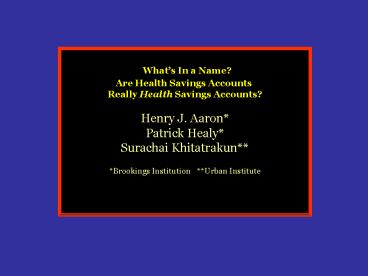What PowerPoint PPT Presentation
About This Presentation
Transcript and Presenter's Notes
Title: What
1
Whats In a Name? Are Health Savings Accounts
Really Health Savings Accounts? Henry J.
Aaron Patrick Healy Surachai Khitatrakun Bro
okings Institution Urban Institute
2
- Major points of the paper
- HSAs are IRAs on steroids and should be
preserved until funds in taxable and
tax-sheltered (IRA, 401k) plans are exhausted - Workers may refuse enrollment in HDI, even
when it dominates - other options
- As incentives to buy high-deductible insurance
(HDI), HSAs are deficient can be arbitraged, are
regressive, and incentive is back-loaded - Other incentives to promote HDI could correct
these shortcomings
3
For medical expenses below 7.5 percent of
adjusted gross income. The special
situations are if the account holder becomes
totally disabled (an exception for HSAs as well)
to comply with a court order to give the money
to a divorced spouse, a child, or a dependent
when one is separated from service, through
permanent layoff, termination, quitting or taking
early retirement after age 54 and if one loses
ones job in the year one turns age 55, or later
and if one loses ones job and sets up a
payment schedule to withdraw money in
substantially equal amounts over the course of
ones life expectancy.
4
(No Transcript)
5
(No Transcript)
6
Net Cost of Health Coverage for Various Levels of
Health Care UseIn Network
7
(No Transcript)
8
Shortcomings of HSAs
- No added saving necessary to establish one
- Can produce negative tax rates
- Regressive
- Deferred benefits mean high-, aß, or hyperbolic
- discounters will undervalue incentive relative
to cost
9
- Possible replacement of HSAs
- as carrots for HDI
- Refundable credits for those adopting HDI
- Grants
- FSAs limited to enrollees in HDI
- Replacement of HSAs with HRAs
Write a Comment
User Comments (0)
Recommended

